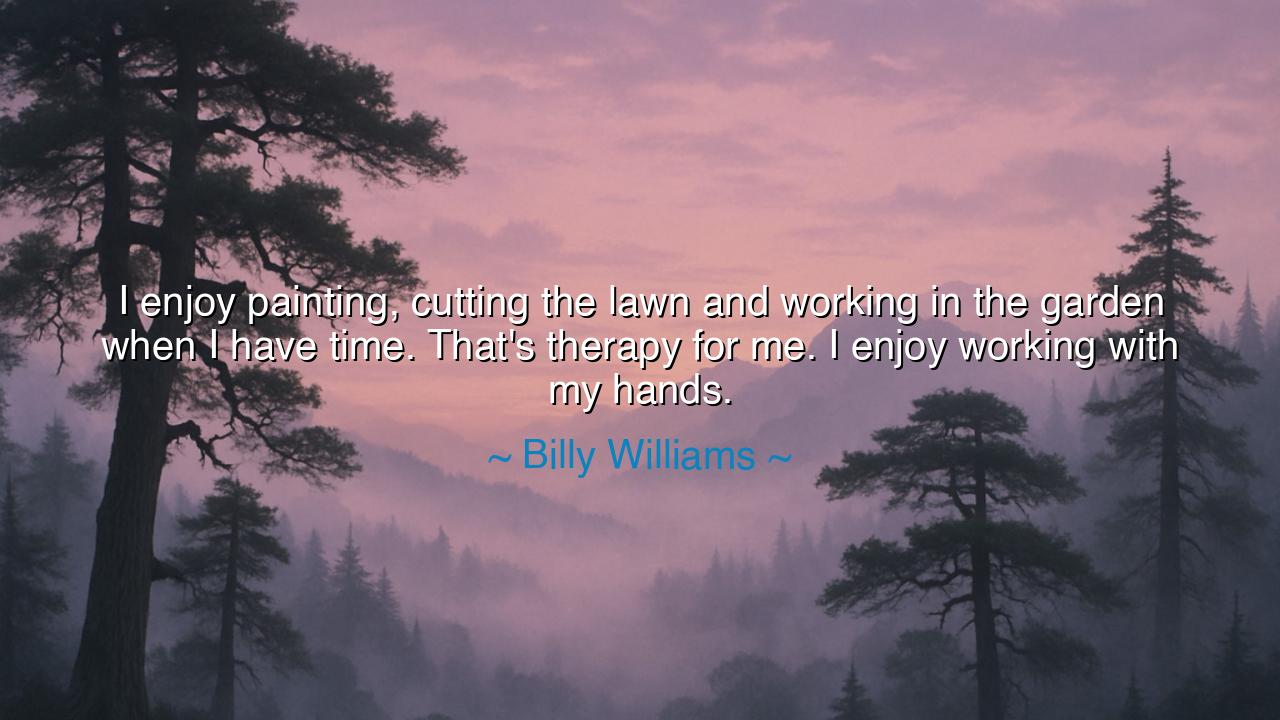
I enjoy painting, cutting the lawn and working in the garden when
I enjoy painting, cutting the lawn and working in the garden when I have time. That's therapy for me. I enjoy working with my hands.






The words “I enjoy painting, cutting the lawn and working in the garden when I have time. That’s therapy for me. I enjoy working with my hands.” were spoken by Billy Williams, the legendary baseball player whose grace on the field was matched by humility in life. Though known for his mastery with the bat, these words reveal a man who understood something deeper than sport — the healing power of simple, honest work. Behind the calm rhythm of his statement lies a timeless truth: that peace is not found in fame, luxury, or endless striving, but in the quiet labor that reconnects us to the earth, to creativity, and to the dignity of our own hands.
When Williams speaks of painting, cutting the lawn, and working in the garden, he invokes acts that are both ordinary and sacred. To many, such tasks might seem trivial — chores to be hurried through or delegated away. But to one who works with sincerity, these are rituals of restoration. They demand no audience, no scoreboard, no applause. In painting, the mind quiets; in mowing the grass, the body moves in steady rhythm; in tending the garden, one cooperates with time and nature. These are acts that ground the spirit, reminding us that the hands which once held tools of ambition can also hold instruments of peace. In them, Williams found his therapy — a word that, in this context, means not treatment, but returning to wholeness.
There is a profound humility in “working with my hands.” For the hands are not merely instruments of labor — they are the extensions of the soul’s will. In an age when many seek comfort in distraction or luxury, Williams reminds us that healing often comes from engagement, not escape. To work with one’s hands is to feel the world again — the roughness of bark, the coolness of soil, the weight of a brush, the pulse of life that flows through creation. The ancients understood this well. The Greek philosopher Epictetus, once a slave, taught that freedom is not the absence of work but the mastery of one’s attitude toward it. The hands that serve with peace become the hands that shape destiny.
In history, we find countless souls who turned to the simplicity of labor to quiet their minds. Winston Churchill, burdened by the storms of war and politics, found refuge in his garden and in painting. Among the flowers and canvases, he rediscovered balance. “A day away from the paintbrush,” he once wrote, “is a day wasted.” Likewise, Leo Tolstoy, weary from the noise of fame, took to plowing his fields by hand, saying that honest work restores what ambition destroys. Like Williams, they sought not escape but reconnection — with the rhythm of life, with their own humanity, with the eternal pattern that underlies both war and peace, victory and rest.
The beauty of Williams’ words lies in their accessibility. He does not speak as a philosopher, but his message carries philosophical weight. He teaches, through example, that therapy is not only in the mind but in the motion of life itself. The garden, the paintbrush, the blade of the mower — these are tools of mindfulness. They draw the scattered self back into harmony. The body moves; the heart calms; the spirit breathes. Each stroke of the brush, each sweep of the lawn, each seed pressed into earth becomes an act of meditation. Through the ordinary, one touches the extraordinary.
And yet, this wisdom carries a moral undercurrent: the reminder that rest is not idleness, and work is not always toil. When done with presence, even simple labor becomes an offering to life. The man who cuts grass with mindfulness may be closer to enlightenment than one who sits in luxury but feels nothing. The woman who tends her garden with love communes with the same creative spirit that spins the stars. In working with our hands, we reclaim what modern life has lost — the joy of creating, maintaining, and caring for something real.
The lesson, then, is both ancient and immediate: when the soul is weary, return to the earth. Let your hands remember what your mind has forgotten — that peace is born from movement, from care, from the union of labor and love.
Practical actions: Spend time each day in an act of creation — paint, build, mend, or garden. Let your mind rest in the rhythm of simple work. Turn off the noise, and let silence speak. See your hands not as servants of necessity, but as channels of peace. For as Billy Williams teaches, true therapy lies not in escape from life, but in returning to it — one brushstroke, one blade of grass, one humble act of creation at a time.






AAdministratorAdministrator
Welcome, honored guests. Please leave a comment, we will respond soon